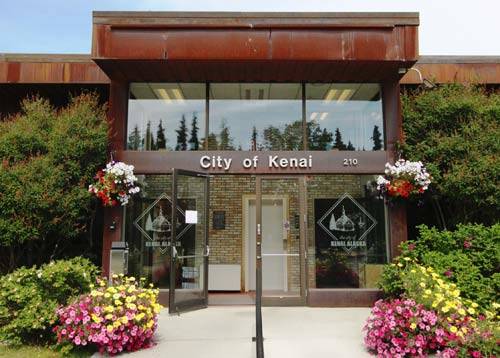Kenai’s government will continue to not record work session meetings of its Planning and Zoning Commission and joint work sessions between its other commissions and committees after an ordinance to do so failed by a tie vote at the Kenai Council’s May 2 meeting.
Council members Tim Navarre, Jim Glendening, and Henry Knackstedt voted against the ordinance. Council member Glenese Pettey was absent.
Prior to October 2017, Kenai made audio and video recordings only of the two groups that cast legally-binding votes — its city council and its planning and zoning commission. Meetings that didn’t include binding votes — those of Kenai’s eight other advisory commissions and committees, or work sessions held for informal discussion rather than legal action — were not recorded.
At the council’s Oct. 19, 2017 meeting, Council member Bob Molloy introduced a successful policy change to record city council work sessions. It passed with opposing votes from Knackstedt and Glendening, and with Navarre absent. At that meeting, Molloy said he might later introduce a similar ordinance to record non-council work sessions. He did so this month.
“Planning and zoning work sessions in particular are often important,” Molloy said. “Recently a month or two ago, there was a work session with borough personnel regarding the borough comprehensive plan. There’s a benefit to the public if that’s recorded and put on the city website, so residents who are unable to attend can hear what happened in that work session at their own time and convenience, on demand. This actually brings more information to the public instead of being an impediment to the public.”
Other recent planning and zoning work sessions include one on March 28 over a proposal to prohibit marijuana cultivators with over 500 square feet of growing space from Kenai’s residential zones. At their May 9 meeting, the planning and zoning commissioners unanimously recommended the proposal to the city council (which will hold a final vote at a future meeting) with little discussion.
Navarre, opposing recordings, said work session discussions are less inhibited than normal council meetings, both for council members and speakers from the public.
“A lot of times work sessions are good brainstorming, and just let the message flow,” Navarre said. “If you have to shut it down to follow a process, sometimes that hurts… Sometimes you let people just flow a little bit.”
Glendening agreed with Navarre’s concern that recorded statements could be taken out of context.
“So many times I’ve found myself maybe playing the devil’s advocate, and asking questions in such a way that may elicit a response rather than reveal my position,” Glendening said. “I think the ability for each of us to take our own notes and come away with our conclusions, and then reveal them in a debate on the floor — I think the process is better served that way.”
After Knackstedt said he would oppose the ordinance in part because of the extra work it would give the city clerk — who’s responsible for making and keeping meeting records — Kenai mayor Brian Gabriel asked Kenai clerk Jamie Heinz how much additional effort recording work sessions would take.
“It’s really just a few minutes of setting up the time and dumping the recording into a drive on the server, and holding it until if someone asked for it,” Heinz said. “…It’s not put on our website at this point. It’s available for anybody doing a public records request.”
Gabriel, a supporter of the ordinance, said his opinion about work session recordings has “evolved, or devolved, depending on how you look at it.”
“I was sort of in agreement that maybe we shouldn’t record these, because there’s really no legislative action going on,” Gabriel said. “Although the fact of the matter is that it is a public meeting — anybody can come and participate… I think you have to look at the recording in the context it’s done in — it is a work session, so there’s an expectation that it’s not going to be as formal as a meeting, but it’s a public meeting at the end of the day. I didn’t see the harm in it, I still don’t see the harm in it — people shouldn’t act different whether they’re being recorded or not, in my opinion.”
Reach Ben Boettger at bboettger@peninsulaclarion.com.

